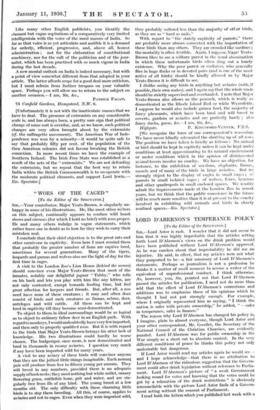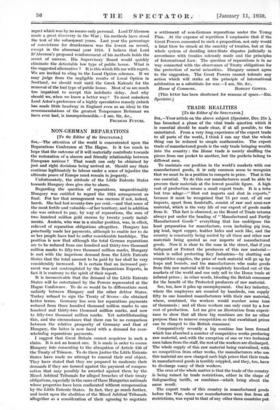LORD D'ABERNON'S TEMPERANCE POLICY [To the Editor of the SPECTATOR.]
SIII,—Lord Astor is rash. I wonder that it did not occur to him that it was highly improbable that the articles setting forth Lord D'Abernon's views on the drink problem would have been published without Lord D'Abernon's approval. As he was careless about that improbability he did me an injustice. He said, in effect, that my articles were not what they purported to be—a fair summary of Lord D'Abernon's statements. Perhaps as journalism is not a profession he thinks it a matter of small moment to accuse a writer of the equivalent of unprofessional conduct. I think otherwise. As, however, you, Sir, pointed out that Lord D'Abernon passed the articles for publication, I need not do more than add that the effect of Lord D'Abernon's corrections and additions was to emphasize those of his opinions which he thought I had not put strongly enough. For example, where I originally represented him as saying, " I think the nation is safer with private ownership," he added, " —safer in temperance, safer in finance."
The reason why Lord D'Abernon has changed his policy is, I imagine, plain to almost everyone, though Lord Astor and your other correspondent, Mr. Goodlet, the Secretary of the National Council of the Christian Churches, are evidently puzzled. Lord D'Abernon was for public ownership in the War simply as a short cut to absolute control. In the very different conditions of peace he thinks this policy not only undesirable but dangerous.
If Lord Astor would read my articles again he would sec-- and I hope acknowledge—that there is no attribution to Lord D'Abernon of the ridiculous suggestion that the Govern- ment could alter drink legislation without reference to Parlia- ment. Lord D'Abernon's picture of " a weak Government looking round for votes and knowing that the votes could be got by a relaxation of the drink restrictions " is obviously irreconcilable with the picture Lord Astor finds of a Govern- ment acting without the consent of Parliament.
I read both the letters which you published last week with a regret which was by no-means-only personal. Lord D'Abernon made a great discovery in the War ; his methods have stood the test of the subsequent years. Last year the percentage of convictions for drunkenness was the lowest on record, except in the abnormal year 1918. I believe that Lord D'Abernon's proposed reinforcement of his methods holds the secret of success. His Supervisory Board would quickly eliminate the detestable low type of public house. What is the suggested alternative ? It is this which fills me with regret. We are invited to cling to the Local Option schemes. If we may judge from the negligible results of Local Option in Scotland, we should wait until the Greek Kalends for the removal of the bad type of public house. Most of us are much too impatient to accept this indefinite delay. And why should we, when we know a better way? To most onlookers Lord Astor's preference of a highly speculative remedy (which has made little headway in England even as an idea) to the recommendations of the greatest Temperance Reformer we have ever had, is incomprehensible.—I am, Sir, &c.,
PRUDENS FUTUIU.







































 Previous page
Previous page